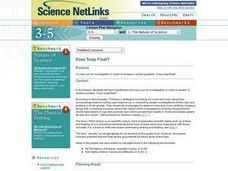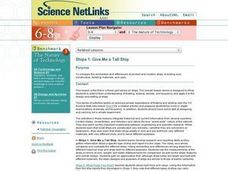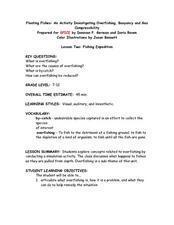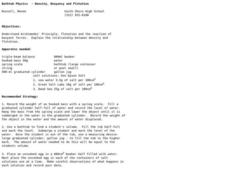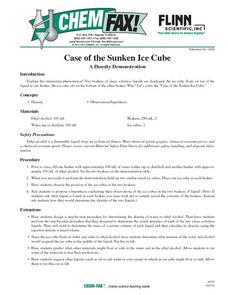Curated OER
How Wet Can You Get?
Students visit a swimming pool and brainstorm different water sports and what benefits swimming has over other types of exercise. They then discuss buoyancy and water pressure and when how objects sink or float before playing a game of...
Curated OER
What Floats Your Boat?
Students discover the Archimedes principle through a buoyancy experiment. They measure the water displacement of a lump a clay which is denser than water then reshape the clay into a bowl which floats but displaces more water.
Curated OER
Rising Air
Students investigate the concept of rising air in the formation of clouds and precipitation. In this rising air instructional activity, students conduct an experiment with hot and cold water that shows how warm water rises due to thermal...
Curated OER
Does Soap Float?
Students form hypotheses and carry out an investigation in order to answer a central question: Does soap float? The focus of this instructional activity is on scientific inquiry, but it incorporates scientific topics such as sinking and...
Curated OER
Cold Hard Facts...What Inquiring Minds Will Know
Students work with "ice" in order to gain a practical application of math concepts that evolve into an inquiry-based study. They determine if the dimensions of the ice make a difference in the way the ice floats in the water.
Curated OER
Build Your Own Submarine
High schoolers construct their own submarine following a certain procedure. In this physics activity, students calculate the density of objects using a mathematical formula. They explain why some object floats in water while some do not.
Curated OER
Buoyancy: What will float and what will sink
Students write and explain why an object sinks or floats. In this buoyancy lesson students demonstrate how items float or sink and graph the results.
Curated OER
Aluminum Boats
Students study buoyancy with an in-class experiment. In this water properties lesson plan, students create a boat from aluminum foil and float it in a bucket of water. Students utilize coins to change the weight of the boat and record...
Curated OER
Insulation and Buoyancy
Students predict whether their hands be warmer in ice water with or without a blubber mitten. They construct a blubber mitten using plastic, Crisco and compare their results with a control group. They observe how this affects buoyancy too.
Curated OER
Give Me a Tall Ship
Sixth graders develop an understanding of floating, sinking, density, and buoyancy and apply it to the design of testing of ships.
Curated OER
Floating Fishes: Fishing Expedition
A referenced PowerPoint is not included, but this lesson can still make an impact with emerging environmentalists. After introducing them to the facts about overfishing, they experiment with a fishing simulation using colored beads and...
Curated OER
Hot Air Balloon
Students view a video and discuss the mechanics of a hot air balloon. They, in groups, construct a functioning hot air balloon.
Curated OER
Pressure, Density and Buoyancy
Students investigate how changing pressure affects density. In this physics activity, students explain the relationship between density and pressure. They observe the Cartesian diver in the lab as pressure is changed inside.
Curated OER
Bathtub Physics - Density, Buoyancy and Flotation
Students study Archimedes' Principle, flotation and the reaction of buoyant forces and explain the relationship between density and flotation.
Reach Out!
Paper Clip Sailing
Young scholars explain that some things can float on top of water because of what we call "surface tension." They see that if something happens to disturb these water molecules from tugging on each other, the skin-like surface breaks up.
Curated OER
Floating Pencil
Students discover how salt water makes a pencil float better than freshwater by measuring and comparing the lengths of the portion of the pencil that floats above the water surface. They then determine if an unknown water sample is...
Curated OER
Floating Vegetables
Students design a craft that safely floats vegetables across a classroom. The teacher provides some materials, but the child may as well. As the experiment is created, they have to fill out worksheets to keep the actiivity organized....
Curated OER
Chemistry: The Case of the Sunken Ice Cube
Students examine a density demonstration involving ice cubes and beakers of water and alcohol. After observing how one ice cube floats in water and sinks in alcohol, they determine which mixture of the two would suspend the ice cube in...
Curated OER
Ballast Systems in Submarines
High schoolers investigate Ballast systems in submarines. In this ballast lesson plan, students conduct experiments that show how a Ballast system works. High schoolers will then create a model of a submarine's ballast system.
Curated OER
Science Lesson Plans
Students conduct a variety of exploration activities on various science topics. In this science lesson plan outline, students design a cell encapsulation to hold a specific type of medicine. They give examples of physical and chemical...
Teach Engineering
Archimedes' Principle, Pascal's Law and Bernoulli's Principle
What do Pascal's law, Archimedes' Principle, and Bernoulli's Principle have to do with fluid mechanics? The included PowerPoint presentation provides the basic definitions and equations associated with the three. A set of homework...
Curated OER
To Float or Not to Float - Density
Students experiment floating a variety of objects in various liquids. They discover how density affects the ability of an object to float and apply the concept of density to solve problems.
Curated OER
Antarctica: Effects of Salinity on Icebergs
Learners investigate the effects of salinity on icebergs. For this hands on lesson, students design and conduct an investigation into how the amount of salt in ice affects its buoyancy.
Curated OER
Hitler's Lost Sub
Students watch a video clip about German submarines lost during World War II. They work together to create their own submarine out of a plastic bottle. They test the buoyancy of the submarine in different activities.
Other popular searches
- Density and Buoyancy
- Sink Float Buoyancy
- Eggs and Buoyancy
- Buoyancy Force
- Relative Buoyancy
- Buoyancy Boat Design
- Density & Buoyancy
- Buoyancy and Boats
- Water Buoyancy
- Buoyancy Swimming
- Buoyancy Ideas
- Neutral Buoyancy





